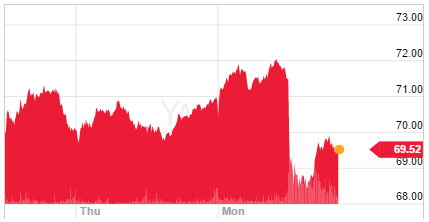It was all over the news yesterday. At the behest of United Airlines, Chicago police forcibly removed a man from a plane yesterday. They treated him the way that you might expect police to treat anyone who is a violent terrorist threat to aviation security, beating him unconscious and dragging him down the aisle. I’m not going to embed the video here because it’s simply too disturbing to watch.
Unfortunately, this wasn’t a terrorist. There was no threat of violence. It was a 69 year old Asian-American doctor who had patients to see the following day, had paid for his seat, had already boarded the plane, and United decided to kick off to make room for commuting employees instead.
Make no mistake: United summoned state violence–with all the weight of anti-terrorism laws behind them–for commercial reasons. First and foremost, the flight wasn’t overbooked. United just wanted the seats for commuting employees instead of paying passengers. Nobody wanted the crappy restricted $800 vouchers that the airline was offering, so in order to save money, United then decided to invoke the denied boarding clause of the Contract of Carriage. This, by law, limits the airline to paying $1,350 per passenger in compensation for denied boarding, and it was clear that this was going to be United’s cheapest option. However, it’s questionable whether it was even legal under both the Contract of Carriage and denied boarding regulations for them to do this in the first place given that the passengers involved had already been boarded, so boarding wasn’t actually being denied. Undoubtedly, this will play out in the courts going forward. In the meantime, it hasn’t been good for United stock: the company lost more than $500 million in market capitalization today.
Even before this, United wasn’t making any friends after devaluing their frequent flier program and introducing a new, worse “basic economy” experience. They’re my second least preferred airline, behind Spirit. Fortunately I have a choice not to fly them–Seattle is a highly competitive airport with Alaska and Delta duking it out for dominance and plenty of other options as well. I usually fly Alaska or Southwest, both of whom have friendly crews and passenger-friendly policies. When I fly one of the three majors, I lean toward Delta; their planes are just a little cleaner, the crews are just a little nicer, and the service is just a little more punctual than the other major US airlines. I’ll still fly United occasionally–for instance, if I need a nonstop to Dulles or Houston at times Alaska doesn’t fly–but I’m usually also glad when the flight is over.
However, if you’re a hub captive, you don’t have any real choice. You’re stuck on United, an airline that will literally have you beaten up and thrown off a plane to make room for their employees if it saves them money (unapologetically so, I might add). However, you can still boycott United even while flying the airline. You just need to realize where United makes its money. For the most part, it’s not actually selling tickets: it’s their Mileage Plus loyalty program.
The most valuable part of any airline is its frequent flier program. Loyalty programs drive a ton of revenue, from credit card mileage sales to shopping portals to data mining. Air Canada received a 20x multiple on earnings when it spun off part of Aeroplan in 2005. In fact, when most major US airlines went bankrupt after the financial crisis, a major part of recapitalization plans was mileage sales to banks. I don’t normally link to The Points Guy, but he recently interviewed analysts who reported that up to 50% of airline revenues come from mileage sales to banks. So, ironically, your commercial value to United Airlines lies far less in whether you buy tickets and fly on their airline, and far more in whether you use their loyalty program.
Want to really punish United Airlines, and discourage them from literally beating you bloody on your next flight? Call up Chase and cancel your Mileage Plus Visa. Clean out your Mileage Plus account and take an international trip on a United partner (it’s always nice to visit Japan on ANA, or southeast Asia on Thai and Singapore). It makes sense to do this anyway–miles only devalue over time. Many people who fly United are better off opening a Singapore Airlines KrisFlyer account and crediting their flights to KrisFlyer anyway, because Singapore gives 100% flown miles credit for most United fare classes. If you must use Mileage Plus to book an award, bank your points in a transferable rewards currency like Chase Ultimate Rewards, and only transfer in your points to immediately redeem an award.
United won’t change its behavior or even apologize until people start voting with their feet. But they’ll laugh all the way to the bank if you keep using their loyalty program while no longer flying United. Burn all your Mileage Plus miles. Spend them to zero. And credit your next United flight to another StarAlliance partner. This will ultimately cost them nearly as much as if you didn’t fly United at all.

